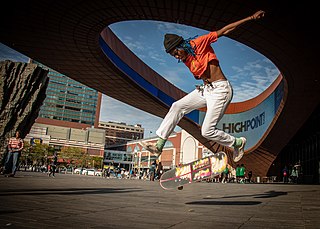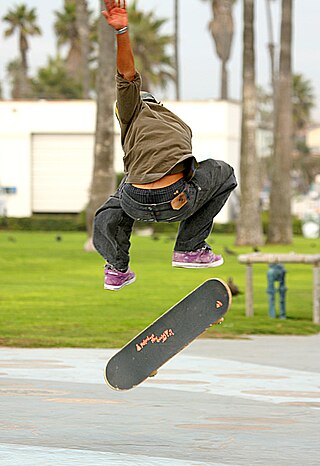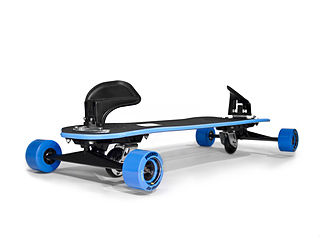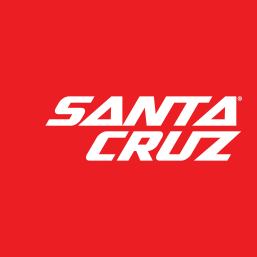
Skateboarding is an action sport that involves riding and performing tricks using a skateboard, as well as a recreational activity, an art form, an entertainment industry job, and a method of transportation. Originating in the United States, skateboarding has been shaped and influenced by many skateboarders throughout the years. A 2009 report found that the skateboarding market is worth an estimated $4.8 billion in annual revenue, with 11.08 million active skateboarders in the world. In 2016, it was announced that skateboarding would be represented at the 2020 Summer Olympics in Tokyo, for both male and female teams.
Boardsports are active outdoor sports that are played with some sort of board as the primary equipment. These sports take place on a variety of terrains, from paved flat-ground and snow-covered hills to water and air. Most boardsports are considered action sports or extreme sports, and thus often appeal to youth. Some board sports were marginalized in the past. However, many board sports are gaining mainstream recognition, and with this recognition, they have enjoyed wider broadcast, sponsorship and inclusion in institutional sporting events, including the Olympic Games.

Roller skating is the act of travelling on surfaces with roller skates. It is a recreational activity, a sport, and a form of transportation. Roller rinks and skate parks are built for roller skating, though it also takes place on streets, sidewalks, and bike paths.

A longboard is a type of skateboard typified by longer decks and wheelbases, larger-diameter and softer (lower-durometer) wheels, and often lower riding height compared to street skateboards, though there is wide variation in the geometry and construction of longboards. Among the earliest types of skateboards, longboards were inspired by surfing, with early longboards drawing from the design of surfboards, resembling and mimicking the motion of riding a surfboard, but adapted to riding on streets in a practice known as sidewalk surfing.

Longboarding is a variation of skateboarding typified by the use of longer boards ("decks") with longer wheelbases and softer wheels. While longboards vary widely in shape and size, compared to street skateboards longboards are designed to be more stable at speed and to have more traction due to larger wheel sizes and softer wheel durometers. While standard street skateboards may typically be between 28 and 34 inches long, longboards can range anywhere from 32 to 50 inches in length. Ride characteristics of longboards generally differ from that of street skateboards due to the use of specialized longboard trucks that have different properties than those typically used with skateboards; while street skateboards use "traditional kingpin" (TKP) trucks that are optimized for tight turning radii, ollie and flip tricks, slides, grinds, and transition skating, longboards are typically paired with "reverse kingpin" (RKP) trucks that are designed for increased stability at higher speeds, more "surfy" carving characteristics, and/or greater ride comfort for commuting over longer distances.

The Trikke is a chainless, pedalless, personal vehicle with a three-wheel frame. The rider stands on two foot platforms above the two rear wheels and steers the vehicle with handlebars attached to the lone front wheel. The cambering system is designed to provide a stable, three-point platform that lets the rider lean into turns while all three wheels remain in contact with the ground. There are several variations of the Trikke, from body-powered fitness machines, to battery-powered transportation and personal mobility vehicles.

A flowboard is a variation on a skateboard, combining aspects of surfing, skating and snowboarding. There are three sizes made by the brand Flowboards: 32", for tricks and smaller riders; 36", the standard size; and 42", the large downhill bomber.
Deluxe Distribution is an Ermico Enterprises, Inc.-owned skateboarding company founded in 1986 with limited partner Brian Ware in San Francisco. Deluxe was formed to distribute the Beware Record label, and other small record labels popular with skateboarders, along with Thunder Trucks and Supercush Bushings. Deluxe distributes six skateboard brands and owns DLXSF, a retail outlet.

A kick scooter is a human-powered street vehicle with a handlebar, deck, and wheels propelled by a rider pushing off the ground with their leg. Today the most common scooters are made of aluminum, titanium, and steel. Some kick scooters made for younger children have 3 to 4 wheels and are made of plastic and do not fold. High-performance kickbikes are also made. A company that had once made the Razor Scooters revitalized the design in the mid-nineties and early two-thousands. Three-wheel models where the frame forks into two decks are known as Y scooters or trikkes.
Russell Wayne Howell is a professional skateboarder. While working towards his degree in physical education, Howell competed and won many freestyle skateboarding competitions throughout his skating career.

A skateboard is a type of sports equipment used for skateboarding. It is usually made of a specially designed 7–8-ply maple plywood deck and has polyurethane wheels attached to the underside by a pair of skateboarding trucks.
A fingerboard is a scaled-down replica of a skateboard that a person "rides" with their fingers, rather than their feet. A fingerboard is typically 100 millimeters (3.9 in) long with width ranging from 26 to 55 mm, with graphics, trucks and plastic or ball-bearing wheels, like a skateboard. A fingerboard can be used to do traditional skateboarding tricks, such as an ollie and kickflip.

A freeboard is a specialist skateboard designed to closely simulate the behavior of a snowboard. Freeboards were developed to allow snowboarders to transition to skateboarding without the need to adapt to a smaller deck and narrower wheel-base.

A brakeboard is a skateboard fitted with a specialised truck assembly that includes a braking mechanism.

An electric skateboard is a personal transporter based on a skateboard. The speed is usually controlled by a wireless hand-held throttle remote, or rider body weight-shifting between front of the board for forward motion and rear for braking. As for the direction of travel to the right or left, it is adjusted by tilting the board to one side or the other. The classification of electric skateboards and legality of their use on roads or pavements varies between countries.

Street skateboarding is a skateboarding discipline which focuses on flat-ground tricks, grinds, slides and aerials within urban environments, and public spaces. Street skateboarders meet, skate, and hang out in and around urban areas referred to as "spots," which are commonly streets, plazas or industrial areas. To add variety and complexity to street skateboarding, obstacles such as handrails, stairs, walls, flower beds, bins, park benches, picnic tables, and other street furniture may be traversed as single tricks or as part of a series of consecutive tricks called a "line."

Santa Cruz Bicycles is a manufacturer of high end mountain bikes based in Santa Cruz, California. They sponsor the Santa Cruz Syndicate, a downhill racing team. The company moved premises from 104 Bronson Street to 2841 Mission Street in 2013. Formerly owned by NHS, Inc. On July 3, 2015, Santa Cruz Bicycles was sold to Pon Holdings, a family-owned Dutch conglomerate with a bicycle division including brands such as Cervélo, Focus and Royal Dutch Gazelle.

Shark Wheel is a company based in Lake Forest, California that manufactures helical wheels of the same name. Rather than a traditional circular shape, the Shark Wheel is composed of one or many three-dimensional sine waves. The shape is a hybrid of a sphere and cube, taking on the properties of both shapes while in motion. It has been touted as the reinvention of the wheel by various news outlets. The wheels were funded by a Kickstarter campaign that reached nearly eight times its initial goal. It attracted the attention of award-winning skateboarder Tony Hawk and was used by skateboarders who placed in various competitions around the world. The product appeared on ABC's Shark Tank in May 2015.
Bravo Sports is a sporting-goods company based in Santa Fe Springs, CA. Bravo manufactures lawn canopies under the brand names QuickShade, ShadeTech, MotoShade, EzUp, etc. The canopies are branded under licenses from Marvel, John Deere, Disney, etc. Bravo also manufactures Airzone trampolines. A separate division manufactures skateboard and scooter parts and products under brand names such as Pulse Performance, Satellite, Maple, and Kryptonics.













